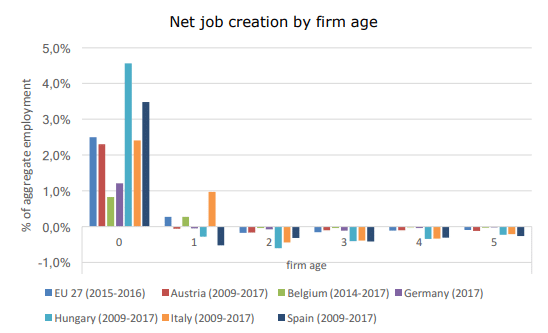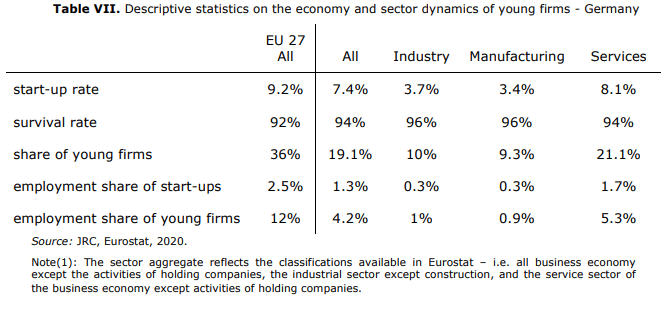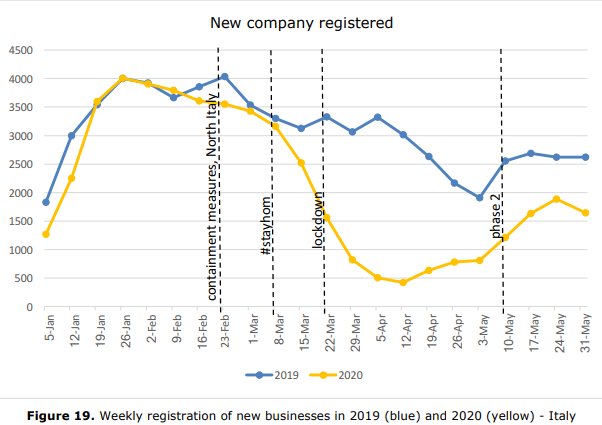The pandemic has created a new meaning to the phrase ‘standing the test of time’. With the number of unique challenges birthed by it and how instantly life has changed, some businesses have taken advantage of their positions, adapted and thrived while others have struggled to survive.
Start-ups have emerged as one of the key drivers of economic growth due to their nature of creating jobs on the market, as demonstrated by the graph below. During the pandemic, start-ups continued to play a vital role in the economy as some have become flexible, reacting to the consumer’s new needs during the pandemic. However, for the most part, start-ups have been facing an array of challenges throughout the pandemic.

(Image Source: Eurostat)
Existing start-ups have faced several challenges as they are undoubtedly a lot more vulnerable than more established businesses who have the strength of a brand and money to overcome the pandemics stresses.
For this reason, start-ups have, over the years, with the shock from covid-19, become more financially fragile at a time concerned with a significant amount of economic uncertainty. A drop in demand has affected revenue calling for more support for start-ups and their short term liquidity which is crucial for their survival.
Acknowledging the changes and challenges may help spark radical innovation, especially as the work from home (WFH) movement continues into the pandemic. For this reason, we could see many new successful start-ups and enterprises come forward in the technology sector. However, the covid-19 pandemic is likely to negatively affect start-ups and the rate and survival of young firms too in other industries.
Previous economic downturns like the Great recession of 2008-2009 provide a baseline scenario of what the European start-up figures could look like in the future. Considering a baseline scenario that start-ups are disrupted and negatively affected by the pandemic, according to the EU start-up calculator, these seniors would result in a substantial and persistent aggregate of employment losses. Moreover, clawing back these effects could take decades, even if start-ups’ activity recovers to pre-covid levels in just a year.
New policies could make a wild change to this scenario. If policies aimed at increasing the survival rate of start-ups were introduced with more significant support from governments in the EU, it would mitigate the overall negative impacts of the crisis. Here is a look at how start-ups have performed over the pandemic in different countries.
Belgium
Statistics of Belgium have shown that its economy has had a low firm exit and entry compared to much of the EU. This is especially true for their industry sectors, which rely heavily on established firms that create jobs rather than start-ups.
The EU start-up calculator has shown 3% of firms have exited within the first year, and their start-up rate has only reached 3.5%, which indicates these values are well below the EU average start-up rate, which is 9.2%-8% entry and exit rate.
Germany
As presented by the table below, the dynamism of Germany indicates that Germany’s economy is somewhat dynamic. This is even after considering the employment share of young firms is still considerably lower than the EU average.

(Image Source: Eurostat)
Over the course of a year, Germany has a 6% exit rate within a given year, with their strat up rate reaching more than 7%, accounting for more than 1% of aggregate employment. However, only 19% is represented by young firms and start-ups compared to 36% in the EU average. Findings have shown that for 2020, employment only reduced 0.6%, although recovery will still be a bit slow.
Italy
Before the pandemic hit, Italy showed some promising figures and was in line with the EU average as their economy relies heavily on jobs created from start-ups. However, the covid pandemic hit start-ups hard in Italy, and since the beginning of the pandemic, about 20,000 fewer new businesses have been created. The graph below shows the weekly registration of new companies in 2019 compared to 2020.

(Image Source: Fornari)
The differences between the two years can be blamed on the challenges brought on by the pandemic, including lockdowns and changes in consumer behavior. Italy was also one of the first and, unfortunately, hardest-hit EU countries. These statistics paint a vivid picture of start-up activity and its disruption, which can have meaningful and significant repercussions for aggregate employment, especially if they do not recover quickly.
There is no denying that the pandemic has hit European start-ups and smaller firms in a way that will take years to regenerate to pre covid figures. However, on the bright side, the pandemic has created an opportunity for technology to thrive in a way that it has not been able to before. Many critics suggest that once things return to some type of normal, an influx of start-ups in the tech sector is expected. They will aim to help consumers live life in the new normal with new everyday tech.
The post Did European Startups Manage to Survive Through The Pandemic? appeared first on Tweak Your Biz.
Did European Startups Manage to Survive Through The Pandemic? posted first on https://tweakyourbiz.com/
No comments:
Post a Comment